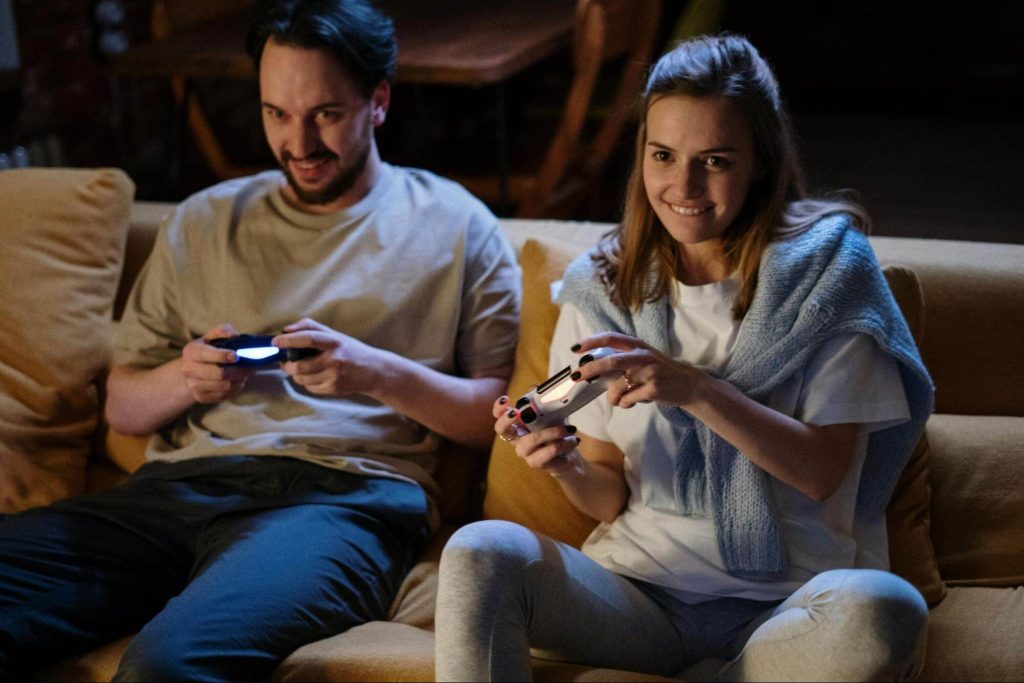Video games have long been a part of millions of lives, but their impact on relationships remains a complex topic. For this article, we analyzed 12 scientific studies, including works from VRIJE University Amsterdam and Frontiers in Psychology. We’ll break down how games affect relationships, strengthening or destroying bonds with partners, children and friends. We’ll also examine factors—from social capital to gender differences—that shape their effects. Special attention will be given to finding help for those whose relationships suffer due to problematic gaming.
How Games Affect Romantic Relationships
Problematic Gaming and Its Consequences
Research shows that problematic gaming can seriously harm romantic relationships. As noted in a study by VRIJE University Amsterdam, men who spend more time gaming often experience conflicts with their partners over the amount of time spent on entertainment and the content of the games. These conflicts are linked to increased physical and relational aggression in relationships. For instance, the study surveyed 1,333 heterosexual couples and found that 60% of men and 34% of women play games, with men’s gaming time more frequently leading to arguments (a correlation between gaming time and media-related issues was 0.20 for men, p<0.01).
Similar findings are supported by a study in Advances in Social Sciences Research Journal. Researchers surveyed 640 college students and discovered that when a partner perceives gaming (such as playing games like World of Warcraft or Fortnite) as highly important, it negatively impacts relationship satisfaction. The correlation between the importance of games to a partner and relationship satisfaction was -0.183 (p<0.01), indicating a significant negative relationship. This means that if one partner prioritizes games too much, the other feels less valued, creating tension.
Key Causes of Conflicts in Couples

How do games affect relationships in such cases? A study titled “Problem gaming-related harm experienced by partners and parents of individuals with gaming problems and their help-seeking experiences” identified the main causes of conflicts related to problematic gaming:
- Neglecting Responsibilities: 96.3% of partners reported that their loved ones fail to handle household chores.
- Social Isolation: 92.5% noted that their partners spend less time at social events.
- Feeling Undervalued: 77.8% felt belittled in their relationships due to the priority given to games.
Another study, published in the Journal of Concurrent Disorders, revealed gender differences in the emotional consequences of gaming. Women whose partners played games (like Candy Crush Saga or Among Us) reported higher levels of depression, anxiety, and stress compared to male gamers and non-gamers. For example, female gamers had an average depression score of 5.112 (p=0.013), an anxiety score of 3.253 (p=0.036), and a stress score of 10.569 (p<0.001), significantly higher than other groups. Researchers suggest this may be linked to negative experiences in gaming communities, including sexism and harassment, as also mentioned in McLean and Griffiths (2019).
Positive Aspects of Playing Together

Despite the potential harm, games can also strengthen relationships, especially when both partners play together. As researchers found in the study from Advances in Social Sciences Research Journal, the frequency of playing together positively correlates with relationship satisfaction (correlation 0.120, p<0.01). This means that couples who play games like Overcooked or It Takes Two together often feel closer to each other. A study from Brigham Young University, published on headstuff.org, confirms this: 76% of couples where both spouses play reported that gaming positively impacts their marriage. Playing together creates shared memories and fosters teamwork, which enhances mutual understanding.
How do games affect relationships when partners play differently? If only one partner is heavily into gaming, it can lead to problems. As stated in the study Analysis in Video Game Addiction and its Effect On Romantic Relationship Among Adolescent in Batam City, excessive gaming by one partner (e.g., playing Mobile Legends: Bang Bang!) negatively affects the couple’s compatibility. Regression analysis—a method that evaluates how one variable impacts another—showed that a high frequency of gaming among men reduces compatibility for women (DAS1 = 5.866 – 0.697 FG2 + 0.112 PG1, where DAS is the compatibility scale and FG is gaming frequency). This highlights the importance of balance: if one partner games excessively, it can disrupt communication and lead to feelings of loneliness for the other.
Financial and Household Challenges
Problematic gaming can also create financial and household difficulties. According to the study, 88.5% of partners of individuals with problematic gaming (e.g., those playing Fortnite or League of Legends) reported reduced spending on leisure activities due to game-related expenses. About 30.4% noted that their partners spend less on essentials like groceries or bills. Additionally, 74.1% of partners indicated that their loved ones shift responsibilities, such as childcare or cleaning, onto them, adding extra burden.
How Games Affect Parent-Child Relationships
Emotional Distance and Conflicts
Games can create emotional distance between parents and children, especially if a child games excessively. Researchers at healthygamer.gg found that children who use games (e.g., Roblox or Minecraft) to cope with negative emotions like loneliness or shame often experience a decline in their relationships with parents. When a child games for 12 hours a day, it’s no longer just entertainment but a way to escape reality, leading to conflicts. Parents often associate these negative interactions with gaming, and their first instinct is often to ban games, which only worsens the situation.
How do games affect relationships in families in such cases? The study “Problem gaming-related harm experienced by partners and parents of individuals with gaming problems and their help-seeking experiences” confirms that parents of children with problematic gaming face significant challenges. Of 104 surveyed parents, 84.6% whose children were classified as problematic gamers (e.g., playing Fortnite) reported that their child’s responsibilities were shifted onto them. Additionally, 61.6% of parents noted they lose sleep due to worries about their child’s gaming behavior.
Positive Effects of Playing Together
However, games can also strengthen parent-child relationships when played together. An analytical article on go-globe.com highlights several benefits of playing together:
- Building Trust: Parents who play games like Pokémon GO with their children create a safe space for communication.
- Developing Teamwork Skills: 59.9% of families who play together report improved teamwork.
- Reducing Conflict: Playing together can reduce tension around gaming time if parents join in the activity.
A study by Wang et al. (2018) showed that families who play together rate their family satisfaction and closeness higher. How do games affect relationships in this context? They become a bridge for communication if parents are willing to participate.
Parents’ Emotional Well-Being
Excessive gaming by children also impacts parents’ emotional well-being. In the study “Problem gaming-related harm experienced by partners and parents of individuals with gaming problems and their help-seeking experiences,” 53.9% of parents of children with problematic gaming experienced distress due to their child’s behavior, while 45.5% reported feelings of hopelessness. How do games affect relationships from a parent’s perspective? This highlights the need for support not only for children but also for parents, who may feel guilt or helplessness.
Social Connections and Emotional Well-Being
The Role of Social Capital
One of the key factors determining how games affect relationships and social connections is social capital—the network of relationships and mutual support a person builds through interaction. A study in Frontiers in Psychology, conducted with 403 adolescents, showed that the level of social capital determines whether games are harmful or helpful. In the high social capital group, gaming time (averaging 54.43 minutes per day in the third phase of the study) increased self-esteem and life satisfaction (correlation 0.120, p<0.01). However, in the low social capital group, gaming time increased depression (correlation 0.116, p<0.01) and decreased self-esteem, creating a vicious cycle: lower self-esteem led to more gaming time.
Comparing Life Satisfaction and Emotional Well-Being of Gamers
The table below shows how social capital affects gamers’ emotional well-being, based on data from Frontiers in Psychology and Journal of Concurrent Disorders:
| Group | Life Satisfaction (Average Score) | Depression Level (Average Score) | Self-Esteem (Average Score) |
|---|---|---|---|
| High Social Capital (Frontiers) | 4.183 (T3, on the SWLS scale: 1–5, where 1 = “strongly disagree,” 5 = “strongly agree”) | 0.347 (T2, on the CESD-11 scale: 0–3, where 0 = “extremely rare,” 3 = “most of the time”) | 2.094 (T1, on the RSES scale: 1–5, where 1 = “strongly disagree,” 5 = “strongly agree”) |
| Low Social Capital (Frontiers) | 4.091 (T2, on the SWLS scale: 1–5) | 0.357 (T3, on the CESD-11 scale: 0–3) | 2.069 (T3, on the RSES scale: 1–5) |
| Female Gamers (Journal of Concurrent Disorders) | Not specified | 5.112 (p=0.013, on the DASS-42 scale: 1–4, where 1 = “not at all,” 4 = “very much”) | Not specified |
These findings show that high social capital can mitigate the negative effects of gaming, while female gamers often face greater emotional challenges.
Emotional Sensitivity and Friendship
For individuals with high emotional sensitivity (ES)—a heightened awareness of nonverbal cues—games can be a way to expand their social circle. Researchers in the study “The Relationship Between Online Video Game Involvement and Gaming-Related Friendships Among Emotionally Sensitive Individuals” found that emotionally sensitive gamers (High-ES) are more likely to use online games to maintain existing friendships and form new ones. For example, High-ES gamers reported having more friends they’ve met offline (an average of 4.61 compared to 2.25 for Low-ES, p<0.01) and more offline friends they’ve brought into online spaces (5.03 versus 3.19, p<0.001). This suggests that games like Words with Friends or FarmVille can be beneficial for those who experience social anxiety.
How do games affect relationships in the context of friendship? For emotionally sensitive people, they provide a safe space to build connections without the fear of rejection.
Emotional Well-Being During the Pandemic
The COVID-19 pandemic highlighted how games affect relationships by helping maintain social connections. A study on gaming during COVID, conducted with 45 participants, showed that social gaming (e.g., playing Among Us) became a vital way to stay connected with friends and colleagues during lockdown. Average gaming time increased from 97.95 minutes per day before the pandemic to 215.59 minutes during stay-at-home orders (p<0.01). The importance of games for staying connected with friends rose from 2.67 to 3.36 on a 5-point scale (p<0.05), underscoring their role as a tool for social capital during challenging times.
Help and Support: What to Do If Your Loved Ones Are Overly Engrossed in Games
Don’t Hesitate to Seek Support: Why It’s Important and Where to Start
If a loved one is overly engrossed in games, it can strain relationships, and seeking support is a crucial step toward improvement. According to the study, only 9% of parents and 8.9% of partners sought help for themselves, despite significant challenges caused by their loved ones’ gaming. Among partners, none sought a psychologist for their gaming partner, and among parents, only 11.2% sought support for their child. This suggests barriers such as shame, fear of stigma, or lack of awareness about available resources. However, ignoring the issue can worsen tension and make it chronic.
Where to start? Try these steps:
- Seek Advice from Loved Ones: 60.9% of partners of problematic gamers and 83.3% of parents discussed the issue with friends or family (according to the study). This can provide emotional support and fresh ideas.
- Explore Online Resources: Online forums and chats helped 8.7% of partners of problematic gamers find like-minded individuals and advice.
- Consider Professional Help: Psychologists and counselors can offer strategies to address the situation.
How do games affect relationships in such families? A lack of support can increase tension, so taking that first step is vital, even if it feels challenging.
Choose Effective Support Methods: What Works Best
When seeking help, it’s important to choose methods that actually work. According to the study, many who sought support didn’t find it effective: only 4 out of 104 parents reported that help (e.g., consulting a psychologist or seeking advice from friends) was useful, and among partners, only one person noted that a psychologist consultation helped. This highlights the need to select methods with proven effectiveness.
Here’s what can help:
- Family Therapy: As noted in Family Studies, family therapy has shown good results in addressing problematic gaming. It benefits not only the gamer but also their loved ones by improving communication and understanding.
- Cognitive Behavioral Therapy (CBT): CBT, also mentioned in the Family Studies article, helps modify harmful behavior and thought patterns, which can enhance family relationships.
- Consulting a Psychologist: While only 30.4% of partners of problematic gamers sought a psychologist for themselves, those who did reported that it helped manage emotional stress.
How do games affect relationships if you choose an ineffective method? The wrong approach can heighten feelings of hopelessness, so it’s crucial to focus on proven solutions.
Apply Scientists’ Recommendations: Practical Steps to Improve Relationships
How do games affect relationships if no action is taken? Problems may only worsen. Scientists offer practical steps to improve the situation.
Healthy Gaming advises parents to “be on the same side.” Instead of banning games, try:
- Understand Why Your Child Plays: Discuss what they love about games like Pokémon GO. For example, ask, “What do you like most about this game?” This can help open a dialogue.
- Offer Alternative Ways to Cope with Emotions: If your child games to relieve stress, suggest doing something together, like playing sports or engaging in creative activities.
For teens whose self-esteem suffers due to low social capital, the study in Frontiers in Psychology suggests:
- Enroll in School Programs to Build Communication Skills: This can help teens feel more confident in social settings.
- Foster a Supportive Gaming Community: Encourage participation in in-game groups where teens can receive praise and support.
- Engage in Offline Activities: Music or sports activities can boost self-esteem and reduce gaming dependency.
How do games affect relationships if you apply these steps? They can become a tool for bonding rather than a source of conflict.
Conclusions: how games affect relationships
Games are a complex tool that can either damage or strengthen relationships, depending on context, engagement level, and social capital. How do games affect relationships negatively? Research shows that problematic gaming often leads to conflicts, emotional strain, and financial difficulties, especially for partners and parents. For instance, 92.6% of partners of problematic gamers experience relationship tension, and 50% of parents feel like “failures.” However, playing together, as in games like Overcooked or Among Us, can strengthen bonds by enhancing social capital. The study “The Relationship Between Online Video Game Involvement and Gaming-Related Friendships” found that during the pandemic, social gaming became a vital way to maintain connections, especially for emotionally sensitive individuals.
How do games affect relationships in the long term? For those whose loved ones are overly engrossed in games, it’s essential not only to seek help but also to recognize that games aren’t just a “waste of time.” They can be a tool for socialization and emotional support if used moderately and with consideration for loved ones’ needs. Scientific evidence emphasizes that a mindful approach to gaming and engaging in shared activities can help strike a balance that preserves your relationships.
FAQ
Gaming itself doesn’t destroy relationships, but excessive engagement can lead to serious issues, especially if it involves neglecting responsibilities and communication. Studies show that 92.6% of partners of problematic gamers experience relationship tension because their loved ones prioritize gaming over family. If not addressed—such as by starting a constructive dialogue or seeking professional help—this can lead to deep conflicts and even breakups. The key is to find balance so gaming doesn’t replace real intimacy.
If gaming starts interfering with daily life—for example, your partner or child stops contributing to family tasks, avoids interaction, or spends excessive time playing—it might signal a problem. Researchers note that a key sign is the shifting of responsibilities: 84.6% of parents report that children with problematic gaming habits offload their duties onto others. Also, pay attention to your emotional state—if you feel lonely or frustrated due to your loved one’s gaming, it’s a red flag. Try starting an open conversation to understand why gaming has taken priority.
Yes, playing together can indeed enhance relationships by creating a space for interaction and shared experiences. Research indicates that couples who play games like It Takes Two together often feel closer because solving in-game challenges fosters teamwork and mutual understanding. For parents and children, games like Pokémon GO can be a way to spend quality time together and build trust. However, both parties need to be genuinely interested in the activity, or it might lead to new conflicts.
If your partner avoids the conversation, it might stem from feelings of shame or fear of conflict, which is common among those with problematic gaming habits. Start the discussion from a place of support rather than blame—for instance, express that you’re concerned about your relationship and want to find a solution together. Scientists recommend seeking help from a family therapist, who can facilitate dialogue, especially if you feel unable to address the issue alone. It’s also helpful to suggest shared activities outside of gaming to gradually restore balance in your relationship.
Gaming can indeed foster social skills, particularly if it involves interacting with other players. Studies show that emotionally sensitive children playing online games like Words with Friends often make friends they later meet in real life, helping them overcome social anxiety. However, it’s important to ensure gaming doesn’t fully replace offline interaction, as that could make a child more withdrawn. Parents should encourage participation in supportive gaming communities while balancing this with real-world activities, like sports clubs.
